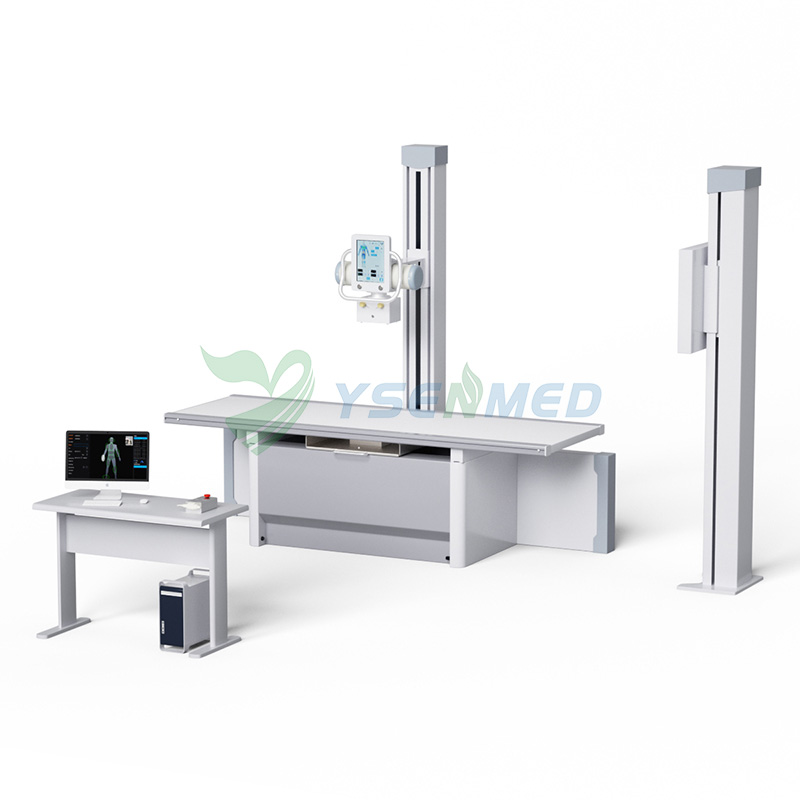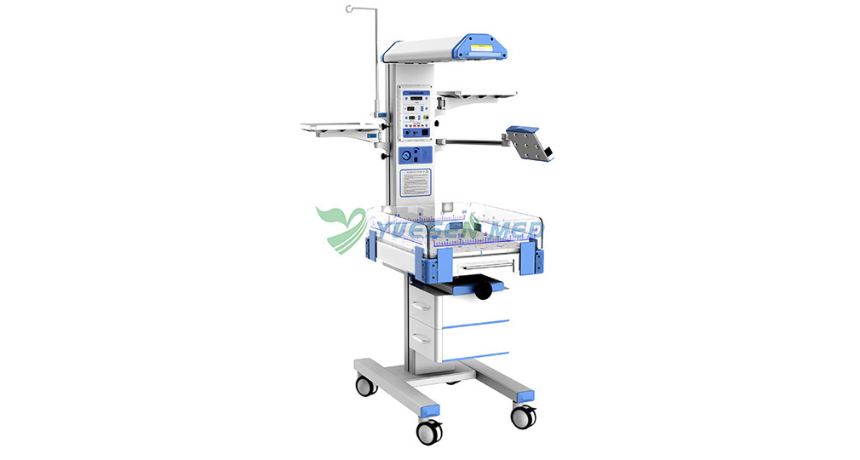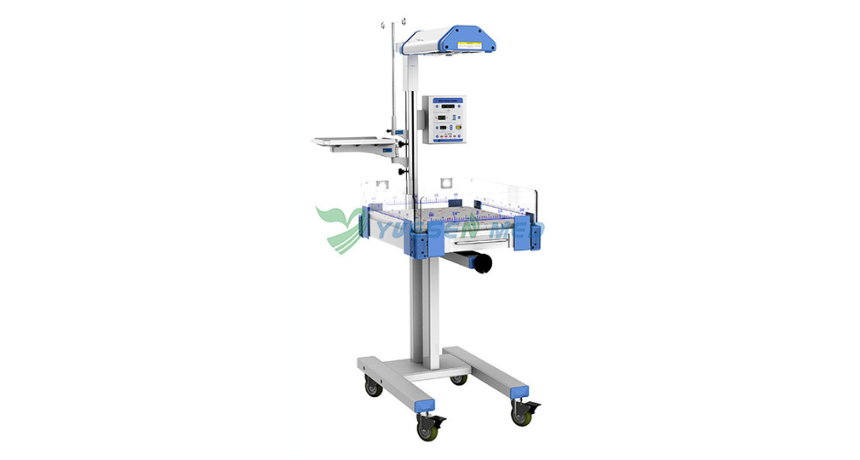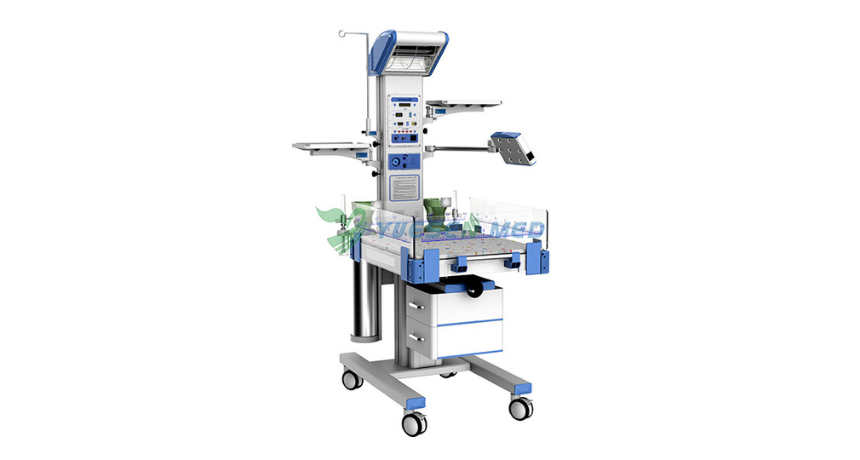Hot Products
YSX500D 50kW DR system set up and put into service in Cambodia.
YSENMED YSX500D 50kW digital x-ray system has been successfully set up and put into service in a hospital in Cambodia.
YSX056-PE serving as a vehicle-mounted x-ray in the Philippines
YSX056-PE 5.6kW portable x-ray unit has been adapted to fit on a truck, to provide mobile x-ray examination service for remote communities in the Philippines.
X Ray Machine To Zimbabwe
x ray machine, 50KW x ray machine
Microscope To Malawi
Achromatic objectives: 4X、10X、40X(S), 100X(S、Oil) Wide field eyepiece: WF10X(WF16X for option) Eyepiece head: Sliding binocular head inclined at 45° Stage: Double layer mechanical stage size 140X140mm, moving range 75X45mm Focusing: Coaxial coarse and
From Diagnosis to Treatment: The Role of a 32kW 400mA Medical Digital X-ray Machine
Views : 1605
Update time : 2024-08-28 10:37:00
When it comes to modern medicine, diagnostic imaging plays a crucial role. Among the various tools available, the digital X-ray machine stands out, particularly the 32kW 400mA models. But what exactly does this mean for patients and healthcare providers? Let's dive deep into the world of medical imaging and discover how these machines bridge the gap from diagnosis to treatment.

Understanding Digital X-ray Technology
What is Digital X-ray?
Digital X-ray is a form of radiography that uses digital sensors instead of traditional film to capture images of the body. This technology allows for immediate viewing and analysis, which is a game-changer in the medical field.
How Does a 32kW 400mA Machine Work?
A 32kW 400mA machine refers to its power output and current. The 32kW indicates the maximum power the machine can deliver, while the 400mA refers to the tube current, which affects the quality and detail of the images produced. Essentially, this machine can produce high-quality images quickly and efficiently.
The Importance of X-ray in Diagnosis
Why Are X-rays Essential?
X-rays are vital for diagnosing a wide range of conditions, from broken bones to infections. They provide a window into the body, allowing healthcare providers to see what's happening beneath the surface without invasive procedures.
Speed and Efficiency in Diagnosis
With a 32kW 400mA digital X-ray machine, the speed at which images are produced is impressive. This efficiency means that doctors can make quicker decisions, which is crucial in emergency situations.
The Transition from Diagnosis to Treatment
How Diagnosis Influences Treatment Plans
Once a diagnosis is made using X-ray imaging, the next step is developing a treatment plan. The clarity and detail provided by a 32kW 400mA machine can significantly impact the chosen course of action.
Advantages of Using a 32kW 400mA Digital X-ray Machine
Enhanced Image Quality
The higher power output and current allow for enhanced image quality. This means clearer images that can reveal more details, which is crucial for accurate diagnoses.
Reduced Radiation Exposure
One of the significant advantages of modern digital X-ray machines is their ability to reduce radiation exposure. With advancements in technology, patients receive lower doses of radiation compared to traditional X-ray machines.
Cost-Effectiveness for Healthcare Facilities
Investing in a 32kW 400mA digital X-ray machine can be cost-effective for healthcare facilities. The efficiency of these machines can lead to quicker patient turnover and reduced operational costs.
The Role of Technicians and Radiologists
Who Operates the Machine?
The operation of a digital X-ray machine requires trained technicians who understand how to position patients and adjust settings for optimal results. Their expertise ensures that the images produced are of the highest quality.
The Radiologist's Interpretation
Once the images are captured, radiologists play a crucial role in interpreting them. Their expertise allows for accurate diagnoses, which directly influences treatment decisions.
Innovations in X-ray Technology
AI and Machine Learning in Imaging
Recent advancements in artificial intelligence and machine learning are revolutionizing how X-ray images are analyzed. These technologies can assist radiologists in identifying abnormalities more quickly and accurately.
Integration with Electronic Health Records (EHR)
Modern digital X-ray machines can integrate seamlessly with EHR systems. This integration allows for easy sharing of images and reports, improving collaboration among healthcare providers.
Patient Experience and Comfort
Making X-ray Procedures Comfortable
Patient comfort is a priority in medical imaging. With advancements in technology, the process of getting an X-ray has become quicker and less intimidating.
Understanding the Procedure
Educating patients about what to expect during an X-ray can alleviate anxiety. Knowing that the process is quick and painless helps patients feel more at ease.
Common Misconceptions About X-rays
Are X-rays Dangerous?
A common misconception is that X-rays are dangerous. While it's true that they involve exposure to radiation, the levels used in modern digital X-ray machines are minimal and safe for diagnostic purposes.
Do X-rays Always Show Problems?
Not every X-ray will reveal an issue. Sometimes, further imaging or tests are necessary to get a complete picture of a patient's health.
The Future of X-ray Technology
What Lies Ahead?
As technology continues to evolve, the future of X-ray imaging looks promising. Innovations in imaging techniques and machine capabilities will further enhance diagnostic accuracy and patient care.
The Role of Research
Ongoing research in medical imaging is crucial. Scientists and engineers are continually working to improve the safety and effectiveness of X-ray technology.
Conclusion
In summary, the 32kW 400mA medical digital X-ray machine plays a pivotal role in the journey from diagnosis to treatment. With its ability to produce high-quality images quickly and safely, it enhances the diagnostic process and ultimately improves patient outcomes. As technology continues to advance, we can expect even greater improvements in the field of medical imaging, ensuring that both patients and healthcare providers benefit from these innovations. So next time you think about X-rays, remember the incredible journey they facilitate in the world of healthcare!
FAQ
How does a digital X-ray differ from traditional film X-rays?
Digital X-rays use electronic sensors to capture images, whereas traditional film X-rays rely on photographic film. Digital technology allows for immediate image viewing, easier storage, and enhanced image quality. Additionally, digital X-rays typically involve lower radiation doses compared to their film counterparts.
Are there any risks associated with having an X-ray?
While X-rays do involve exposure to radiation, the levels used in medical imaging are generally considered safe. The benefits of accurate diagnosis often outweigh the risks. However, healthcare providers take precautions to minimize radiation exposure, especially for vulnerable populations like pregnant women and children.
How long does it take to get results from a digital X-ray?
The time it takes to receive results from a digital X-ray can vary. In many cases, images can be viewed almost immediately after the procedure, allowing radiologists to analyze them quickly. However, the final report may take a few hours to a couple of days, depending on the facility's workflow and the complexity of the case.
Can I eat or drink before an X-ray?
In most cases, you can eat and drink normally before an X-ray. However, if you are scheduled for a specific type of X-ray, such as one involving contrast materials, your healthcare provider may give you specific instructions regarding fasting or dietary restrictions. Always follow the guidance provided by your medical team.

Understanding Digital X-ray Technology
What is Digital X-ray?
Digital X-ray is a form of radiography that uses digital sensors instead of traditional film to capture images of the body. This technology allows for immediate viewing and analysis, which is a game-changer in the medical field.
How Does a 32kW 400mA Machine Work?
A 32kW 400mA machine refers to its power output and current. The 32kW indicates the maximum power the machine can deliver, while the 400mA refers to the tube current, which affects the quality and detail of the images produced. Essentially, this machine can produce high-quality images quickly and efficiently.
The Importance of X-ray in Diagnosis
Why Are X-rays Essential?
X-rays are vital for diagnosing a wide range of conditions, from broken bones to infections. They provide a window into the body, allowing healthcare providers to see what's happening beneath the surface without invasive procedures.
Speed and Efficiency in Diagnosis
With a 32kW 400mA digital X-ray machine, the speed at which images are produced is impressive. This efficiency means that doctors can make quicker decisions, which is crucial in emergency situations.
The Transition from Diagnosis to Treatment
How Diagnosis Influences Treatment Plans
Once a diagnosis is made using X-ray imaging, the next step is developing a treatment plan. The clarity and detail provided by a 32kW 400mA machine can significantly impact the chosen course of action.
Advantages of Using a 32kW 400mA Digital X-ray Machine
Enhanced Image Quality
The higher power output and current allow for enhanced image quality. This means clearer images that can reveal more details, which is crucial for accurate diagnoses.
Reduced Radiation Exposure
One of the significant advantages of modern digital X-ray machines is their ability to reduce radiation exposure. With advancements in technology, patients receive lower doses of radiation compared to traditional X-ray machines.
Cost-Effectiveness for Healthcare Facilities
Investing in a 32kW 400mA digital X-ray machine can be cost-effective for healthcare facilities. The efficiency of these machines can lead to quicker patient turnover and reduced operational costs.
The Role of Technicians and Radiologists
Who Operates the Machine?
The operation of a digital X-ray machine requires trained technicians who understand how to position patients and adjust settings for optimal results. Their expertise ensures that the images produced are of the highest quality.
The Radiologist's Interpretation
Once the images are captured, radiologists play a crucial role in interpreting them. Their expertise allows for accurate diagnoses, which directly influences treatment decisions.
Innovations in X-ray Technology
AI and Machine Learning in Imaging
Recent advancements in artificial intelligence and machine learning are revolutionizing how X-ray images are analyzed. These technologies can assist radiologists in identifying abnormalities more quickly and accurately.
Integration with Electronic Health Records (EHR)
Modern digital X-ray machines can integrate seamlessly with EHR systems. This integration allows for easy sharing of images and reports, improving collaboration among healthcare providers.
Patient Experience and Comfort
Making X-ray Procedures Comfortable
Patient comfort is a priority in medical imaging. With advancements in technology, the process of getting an X-ray has become quicker and less intimidating.
Understanding the Procedure
Educating patients about what to expect during an X-ray can alleviate anxiety. Knowing that the process is quick and painless helps patients feel more at ease.
Common Misconceptions About X-rays
Are X-rays Dangerous?
A common misconception is that X-rays are dangerous. While it's true that they involve exposure to radiation, the levels used in modern digital X-ray machines are minimal and safe for diagnostic purposes.
Do X-rays Always Show Problems?
Not every X-ray will reveal an issue. Sometimes, further imaging or tests are necessary to get a complete picture of a patient's health.
The Future of X-ray Technology
What Lies Ahead?
As technology continues to evolve, the future of X-ray imaging looks promising. Innovations in imaging techniques and machine capabilities will further enhance diagnostic accuracy and patient care.
The Role of Research
Ongoing research in medical imaging is crucial. Scientists and engineers are continually working to improve the safety and effectiveness of X-ray technology.
Conclusion
In summary, the 32kW 400mA medical digital X-ray machine plays a pivotal role in the journey from diagnosis to treatment. With its ability to produce high-quality images quickly and safely, it enhances the diagnostic process and ultimately improves patient outcomes. As technology continues to advance, we can expect even greater improvements in the field of medical imaging, ensuring that both patients and healthcare providers benefit from these innovations. So next time you think about X-rays, remember the incredible journey they facilitate in the world of healthcare!
FAQ
How does a digital X-ray differ from traditional film X-rays?
Digital X-rays use electronic sensors to capture images, whereas traditional film X-rays rely on photographic film. Digital technology allows for immediate image viewing, easier storage, and enhanced image quality. Additionally, digital X-rays typically involve lower radiation doses compared to their film counterparts.
Are there any risks associated with having an X-ray?
While X-rays do involve exposure to radiation, the levels used in medical imaging are generally considered safe. The benefits of accurate diagnosis often outweigh the risks. However, healthcare providers take precautions to minimize radiation exposure, especially for vulnerable populations like pregnant women and children.
How long does it take to get results from a digital X-ray?
The time it takes to receive results from a digital X-ray can vary. In many cases, images can be viewed almost immediately after the procedure, allowing radiologists to analyze them quickly. However, the final report may take a few hours to a couple of days, depending on the facility's workflow and the complexity of the case.
Can I eat or drink before an X-ray?
In most cases, you can eat and drink normally before an X-ray. However, if you are scheduled for a specific type of X-ray, such as one involving contrast materials, your healthcare provider may give you specific instructions regarding fasting or dietary restrictions. Always follow the guidance provided by your medical team.
Related News
Read More >>
 What is the Difference Between Radiant Warmer and Phototherapy?
What is the Difference Between Radiant Warmer and Phototherapy?
Apr .19.2025
Radiant warmers and phototherapy are crucial in neonatal care, but they serve different purposes. Let's dive into the nitty-gritty of these two techniques and explore how they differ, and when each is appropriate.
 YSX056-PE portable digital x-ray unit set up in the Philippines
YSX056-PE portable digital x-ray unit set up in the Philippines
Apr .19.2025
YSX056-PE portable digital x-ray unit has been set up in a hospital in the Philippines and the good quality images please the doctors.
 Is an Infant Radiant Warmer Good for Babies' Health?
Is an Infant Radiant Warmer Good for Babies' Health?
Apr .13.2025
What exactly is the infant radiant warmer, and how does it contribute to a baby's health? Let's dive into this topic and explore the ins and outs of infant radiant warmers.
 What is an Infant Radiant Warmer?
What is an Infant Radiant Warmer?
Apr .12.2025
One of the unsung heroes in neonatal care is the infant radiant warmer. But what exactly is it? Let's dive into the world of infant care and explore the ins and outs of this vital device.



